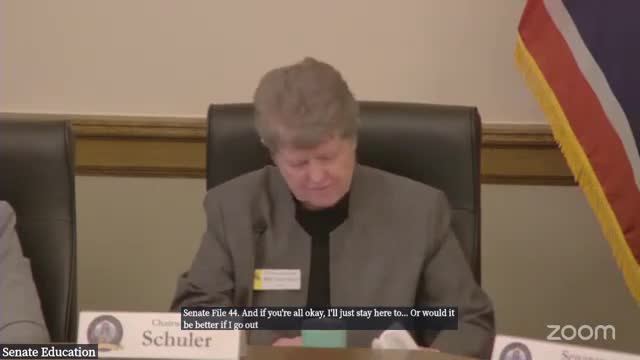Committee approves bill limiting intercollegiate competition by sex; opponents cite fairness and administrative concerns
Get AI-powered insights, summaries, and transcripts
Subscribe
Summary
The Senate Education Committee approved Senate File 44 on Jan. 17, a bill requiring intercollegiate athletic competition at Wyoming public colleges to be determined by the student’s biological sex as recorded on official documents.
CHEYENNE, Wyo. — The Senate Education Committee on Jan. 17 approved Senate File 44, which would require students at the University of Wyoming and Wyoming community colleges to compete in intercollegiate athletics according to the biological sex listed on official birth records or other government documentation.
Chairwoman Schueller introduced the bill and said she and others had worked with college officials while drafting the language. The bill’s original broader definition of “athletic competition” prompted questions; the committee adopted an amendment to limit the definition to “intercollegiate athletic competition,” a change sponsors said reflected their intent.
Senator Landon and others who supported the bill said it is intended to preserve fairness and safety for biological female athletes. Several college athletes and supporters testified in favor. Macy Fox, a senior on the University of Wyoming women’s volleyball team, told the committee her team forfeited matches to avoid playing an opposing team that rostered a trans-identified male athlete, costing them conference-play opportunities. “No female athlete should ever be put in such a position,” Fox said.
Opponents — including student athletes, equality advocates and some college administrators — urged the committee to allow the NCAA, NJCAA or sports organizations to develop sport-specific policies, or to adopt standards that account for hormones and other competitive measures rather than an across-the-board ban. Nioka Erickson, a long-time women’s flat-track roller-derby participant, told the committee she plays at high competitive levels and said national sport organizations (she named the Women’s Flat Track Derby Association) have managed inclusion successfully without state mandates.
Wyoming Equality and other witnesses suggested middle-ground approaches that default toward participation unless a documented unfair advantage is demonstrated and remedial standards are applied. The testimony also included legal arguments: some witnesses cited Title IX and court rulings, while others discussed ongoing litigation in other states.
The committee approved the narrower definition amendment and then passed the bill as amended. Roll call recorded four ayes and one no: Senators Brennan, Olson, Scott and Chairwoman Schueller voted aye; Senator Rothfuss voted no.
What this does and doesn’t do: The bill as drafted would not expressly give institutions authority to bar non‑Wyoming visiting teams from competing in events that include athletes who would be ineligible under Wyoming law; college officials said they expect administratively difficult cross‑jurisdiction situations and will look to the NJCAA and NCAA for guidance.
What supporters said: Supporters framed the bill as protecting female athletes’ safety and competitive opportunities. Several public witnesses described personal or anecdotal harms and urged lawmakers to act.
What opponents said: Opponents said the issue is complex and varies by sport, and urged that sport associations or institutions be allowed to create sport-specific standards, including hormone thresholds and other eligibility criteria.
Next steps: With committee approval the bill moves to the full Senate. The committee did not adopt sport‑by‑sport rules; staff and witnesses urged continued consultation with athletic associations and college administrators.
